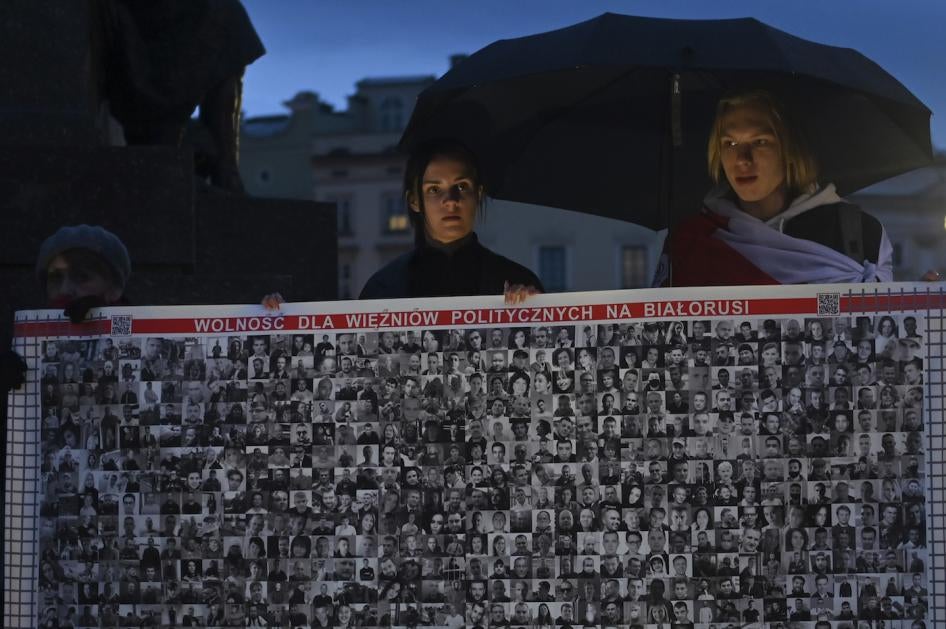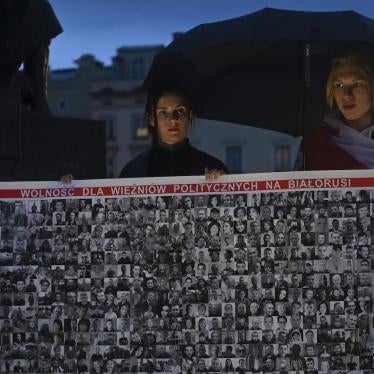Update: On January 5, Aliaksander Lukashenka signed the amendments to the 2002 citizenship law. On July 11, the amendments entered into force.
(Vilnius, December 22, 2022) – Belarusian parliament passed legislative amendments to a 2002 citizenship law that could be used to target members of the political opposition, activists, and other critics in exile, Human Rights Watch said today. The draft law, if endorsed by the president, would allow the president to strip Belarusians abroad of their citizenship, even if they have no other.
After mass protests in August 2020 and the repressions that followed, thousands of people fled Belarus, fearing persecution. The exact number of those who have fled is unknown, though there was an increase of over 3,500 – from 7,837 to 11,431 – of Belarusian refugees and asylum seekers registered globally with the UN refugee agency, UNHCR between 2020 and 2021. Thousands of others have obtained humanitarian or other visas. Most Belarusians have fled to Poland, Lithuania, Latvia, Germany, the Czech Republic, Estonia, or other European Union member states, as well as to Georgia and Ukraine, with many subsequently displaced from Ukraine during 2022, according to the UN special rapporteur on human rights in Belarus.
“Widespread and systematic crackdowns on dissent in Belarus and massive politically motivated prosecutions have already forced many Belarusians to leave their country,” said Anastasiia Kruope, assistant Europe and Central Asia researcher at Human Rights Watch. “The efforts to prosecute Belarusians abroad and to facilitate stripping their citizenship are unprecedented acts of repression against Belarusians in exile.”
Legal provisions for stripping citizenship from naturalized Belarusian citizens convicted of certain crimes were adopted in August 2021. The proposed amendments would extend these provisions to Belarusian natural-born citizens.
On December 21, 2022, Belarusian parliament’s upper chamber passed the Law on Citizenship amendments. In addition to introducing new requirements for Belarusians to notify authorities about their foreign citizenship or residence permit, the bill permits stripping the citizenship of Belarusians abroad who are convicted by Belarusian courts of the crimes of “participation in an extremist organization” or “grave harm to the interests of Belarus.” Liliya Ananich, the deputy head of the Permanent Commission on Human Rights, National Relations, and Mass Media of the parliament’s lower chamber, said that the decision to strip people of their citizenship would be made by the president on a case-by-case basis.
The bill lists 55 articles of the Belarus’s Criminal Code that would qualify as “participation in an extremist organization” or “causing grave harm to the interests of Belarus.” Many of the articles are already extensively used for politically motivated prosecutions. Among these articles, according to data gathered by the Belarusian human rights organization Viasna, more than 200 current political prisoners were charged with “incitement of hatred” (article 130), 148 were charged with “participation in mass riots” (part 2 of article 293), and 140 were charged with “violence or threat of violence against a law enforcement officer” (article 364).
Ananich said that the provisions in the amendments would only apply to citizens who “forfeited their legal bond” with Belarus. However, it is not clear how this would be evaluated.
In September, the head of Belarusian state, Aleksander Lukashenka, spoke out in support of stripping Belarusians in exile of citizenship, implying they were “unworthy” of such citizenship.
Ananich said that the bill is aimed at ensuring “domestic security, national interests” and “stability of the socio-political system” as well as “preventing Belarusian citizens from committing crimes against national security and state interests.”
In July, Belarusian authorities amended the Criminal Code to allow for “special procedures,” referring to criminal proceedings and trials held without the defendant present. The amended Criminal Code envisages trials in absentia for those accused with one or more offense under 43 articles of the Criminal Code, including “incitement of hatred,” “participation in mass protests,” “calling for sanctions” against Belarus, “high treason,” and acts of terrorism. The death penalty is stipulated as a possible penalty for some of these crimes.
The authorities have already initiated “special procedures” against 16 people, including members of opposition’s Coordination Council, the human rights group Viansa, Telegram channel “Nexta,” and Belarusian Sport Solidarity Foundation.
On December 12, the Minsk city court opened the first “special procedure” trial against five defendants, who had all fled Belarus, charged with “incitement of social hatred” and “illegal actions in relation to private life and personal data” over administering or otherwise contributing to the “Black Book of Belarus” Telegram channel. The channel, now blocked by Telegram, was created during August 2020 protests and published personal information of law enforcement officers, judges, and state officials allegedly involved in rights violations.
Volga Vysotskaia, one of the five defendants, fled Belarus in 2020 to another European country. She told Human Rights Watch that the court dismissed or ignored her requests to allow joining the trial online and reading the case file. The court claimed there were no legal grounds to satisfy her requests but she was welcome to participate in person.
Vysotskaia only discovered that the investigator had appointed her a lawyer after she reached out to the Minsk city bar association. She managed to get in touch with the state-appointed lawyer, but he then blocked her number. Vysotskaia asked the court to discharge the lawyer, but the judge reportedly refused. On December 14, the court closed the trial to the public.
Vysotskaia repeatedly reached out to the authorities, including the Investigative Committee and the Prosecutor General’s Office, asking to clarify her rights in the trial, however, she did not receive any substantive response.
The newly introduced “special procedures” take the violation of the right to fair trial in Belarus to a whole new level, Human Rights Watch said. These procedures, together with the draft amendments to the law on citizenship, create grave risks of arbitrary deprivation of citizenship on political grounds, which can result in statelessness.
Obligations on states to prevent statelessness are deeply rooted in international human rights law. Article 15 of the Universal Declaration of Human Rights protects everyone’s right to a nationality and prohibits the arbitrary deprivation of nationality.The UN Convention on the Reduction of Statelessness, to which Belarus is not a party, generally prohibits the withdrawal of citizenship when doing so would result in statelessness. While the Convention allows for deprivation of the only citizenship for those who conducted themselves “in a manner seriously prejudicial to the vital interests of the State,” it prohibits “deprivation of any person or group of persons of their nationality on racial, ethnic, religious or political grounds” (Article 9).
Article 10 of Belarusian constitution stipulates that “no one can be deprived of Belarusian citizenship.” The Belarusian Law on Citizenship also declares avoidance of statelessness to be one of its key principles.
“Stripping Belarusians in exile of their citizenship would be a reprisal against those already forced to abandon their country and a betrayal of a key principle in international law,” Kruope said. “The UN refugee agency and countries hosting Belarusians should ensure that any Belarusians stripped of their citizenship on political grounds have access to legal avenues to protection and all basic rights guaranteed under the 1954 UN Convention relating to the Status of Stateless Persons.”







